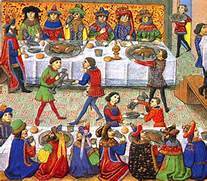The Seven Deadly Sins – And What They Say About Medieval Society

The other day, a friend and I were trying to list the seven deadly sins. We couldn’t, so we went and looked them up. The list surprised me for including “sins” that seem odd in modern society and that got me thinking about how the definition of “deadly sins” reflected the ills of Medieval Society. Essentially, the Church was trying to discourage certain types of behavior thought to be detrimental to a functioning, Christian society by proclaiming them “deadly” sins – sins so egregious that they brought the sinner “spiritual death” – if the sinner did not repent, do penance and receive absolution.
Now some of the deadly sins still strike us as reprehensible behavior. Wrath, for example, is something no one would recommend and most people would agree brings harm – usually not only to the intended target. Likewise lust is a sin whose negative impact is widely recognized to this day. No matter how tolerant modern society may be of sexual freedom for consenting adults, lust remains a dangerous emotional force behind many modern crimes from child abuse and rape to trafficking in persons. Finally, envy is still seen as undesirable.
But greed has more recently been praised as “good” – some people in modern society equating it with ambition and the driving force behind capitalism and free private enterprise. Even more striking, “pride” is something we hold up as a virtue, not a sin. We are proud of our country, proud of our armed forces, proud to be who we are – or at least we strive to be. And who nowadays would put “gluttony” or “sloth” right up there beside lust, wrath and envy?

Upon reflection, however, I concluded that the deadly sins tell us a great deal about what behavior Medieval Society particularly feared.
In a society where hunger was never far from the poor and famines occurred regularly enough to scar the psyche of contemporaries, excessive consumption of food was not about getting fat it was about denying others. Because there were always poor who did not have enough to eat just around the corner, someone who indulged in gluttony rather than sharing excess food was clearly violating the most fundamental of Christian principles. Nothing could be more essential to the concept of Christian charity than giving food to the hungry, and a person who not only kept what he/she needed for himself but engaged in excess eating was therefore especially sinful.
 "Charity" by Edmund LeightonSloth is the other side of the same coin. In a society without machines, automation or robots, the production of all food, shelter and clothing depended on manual labor. Labor was the basis of survival, and survival was often endangered. Medieval society could not afford for any member to be idle. Even the rich were not idle! Medieval queens, countesses and ladies no less than their maids spun, wove and did other needlework – when they weren’t running the estates of their husbands. The great magnates of the realm were the equivalent of modern corporate executives, managing vast estates and ensuring both production and distribution of food-stuffs. The gentry provided not just farm management but the services now provided by police, lawyers and court officials. In medieval society every man and woman had their place – and their job. Whether the job was to work the land or to pray for the dead, it was a job that the individual was expected to fulfill diligently and energetically. Sloth was a dangerous threat to a well-functioning society.
"Charity" by Edmund LeightonSloth is the other side of the same coin. In a society without machines, automation or robots, the production of all food, shelter and clothing depended on manual labor. Labor was the basis of survival, and survival was often endangered. Medieval society could not afford for any member to be idle. Even the rich were not idle! Medieval queens, countesses and ladies no less than their maids spun, wove and did other needlework – when they weren’t running the estates of their husbands. The great magnates of the realm were the equivalent of modern corporate executives, managing vast estates and ensuring both production and distribution of food-stuffs. The gentry provided not just farm management but the services now provided by police, lawyers and court officials. In medieval society every man and woman had their place – and their job. Whether the job was to work the land or to pray for the dead, it was a job that the individual was expected to fulfill diligently and energetically. Sloth was a dangerous threat to a well-functioning society. "Sewing" by Edmund LeightonMy most recent work is a biographical novel of Balian d'Ibelin in three parts. Here, as always I strive for an accurate portrayal of medieval society.
"Sewing" by Edmund LeightonMy most recent work is a biographical novel of Balian d'Ibelin in three parts. Here, as always I strive for an accurate portrayal of medieval society.


Buy now! Buy now! Release August 2016
Published on July 17, 2016 03:00
No comments have been added yet.



